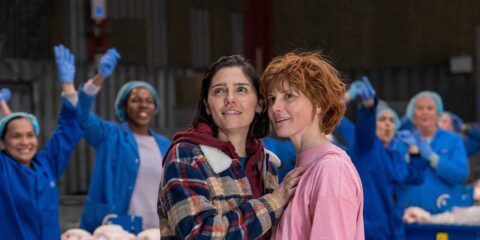There’s something quite endearing about a musical where the cast isn’t very good at singing. Not that Chuck Chuck Baby (Janis Pugh, 2023) is much of a musical either. Its characters don’t so much break out into big song-and-dance routines as much as emotively mumble and dance along to their favourite tracks — providing a welcome relief from the drudgery of everyday life. In the rolling hills of sleepy northern Wales, the right hit provides instant transportation, especially for those who look — and sound — nothing like your average Hollywood star.
Mixing the generosity of Everyone Says I Love You (Woody Allen, 1996) with the colours and working-class milieu of Jacques Demy’s work, Janis Pugh’s sort-of musical debut hums along with charm and loveliness, overcoming cringier elements of the script through excellent, nuanced performances and sheer goodwill. It’s the operatic British soap opera I never knew I needed.
Pugh gambles in an early scene, with our protagonist Helen (Louise Brealey) singing along to Neil Diamond’s soaring, string-laden ballad, “I Am… I Said” in her car. (This strangely marks the second Neil Diamond appearance of the year, somehow, after A Song Sung Blue (Zihan Geng, 2023)). It’s a big song and a big moment to try and establish yearning, sorrow and fear all in one character so early on, but Brealey, schooled in Casualty (1986-end-of-time) and Sherlock (2010-2017), is easily able to encapsulate these contrasting emotions — even if she sings out-of-tune and out-of-time while missing half the lyrics.
She’s right to daydream. It might be all she can do. With no family to call her own, she reluctantly lives with her ex-husband Gary (Celyn Jones), his girlfriend and their baby — spending her free time looking after his dying mother Gwen (Sorcha Cusack). And her day job at the chicken factory provides little respite. She and the other women wrap chickens for several hours a day, constantly watching the clock while playing games to pass the time. One woman estimates they’ve probably wrapped over 10 million chickens since they started. But while chickens can be easily packaged and consumed, the human heart is quick to chicken out when confronted with overwhelming, confused emotions.
So when her childhood crush Joanne (Annabel Scholey) finally returns to town, Helen doesn’t want to see her. The fear of being rejected, of not even being remembered, haunts her — makes her believe it’s not even worth trying. Yet in a nice twist, Joanne — who has the particularly romantic yet lonely job of repairing electricity pylons — always fancied her back. Thus their struggle isn’t so much towards each other, but inwards: reconciling their idea of themselves with the reality, and finding a way towards a new beginning.
There is a sense of inevitability here. Despite touching on some very real and dark emotions, this is still a feel-good musical, its progressive queer bent heavily supported by old-school musical movie sentiment and romantic songs from the 60s and 70s. And there are moments that tip into roll-your-eyes cringe that brings to mind the corniness of Pride (Matthew Warchus, 2014). But there’s also a great deal of bawdy humour (you’ll hear the word “fanny” a lot), a fine eye for widescreen frames (shot on film, no less) and some bold, bright colour schemes — showing that Pugh has studied the rich mix of realism and romanticism found in The Umbrellas of Cherbourg (Jacques Demy, 1964). And the romance feels earned, as endearing to the audience as all the out-of-tune singing. You can’t help but root for these lovely, fucked-up Welsh women.

Redmond is the editor-in-chief of Journey Into Cinema.




